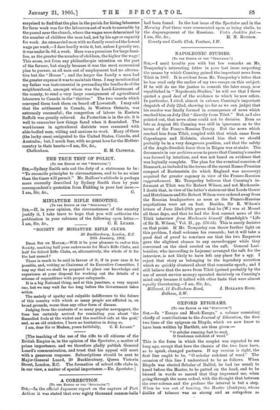the pound near the church, where the wages were determined
by the number of children the man had, not by his age-or capacity for work. An unmarried man with no family received the lowest wage per week,—I dare hardly write it, but, unless I greatly err, it was under 3s. 6d. a week. Here was a premium for large fami- lies, as the greater the number of children, the higher the wage ! This arose, not from any philanthropic intention on the part of the farmer, but simply because it was the most economical plan to pursue, as all men out of employment had no alterna- tive but the " House " ; and the larger the family a man had the greater expense it was to maintain them. I may mention that my father was instrumental in persuading the landlords of the neighbourhood, amongst whom was the Lord-Lieutenant of
• the county, to send a very large consignment of agricultural labourers to Canada in the " thirties." The two vessels which conveyed them took them on board off Lowestoft. I may add that the settlement in Canada, in Western Ontario, was extremely successful ; the congestion of labour in Eastern Suffolk was greatly relieved. As Protection is in the air, it is well to remember how things fared when it flourished. The workhouses in agricultural districts were crammed with able-bodied men, willing and anxious to work. Many of them (the lucky ones) emigrated to the United States, Canada, and • Australia; but, I much fear, with no great love for the Mother. country in their hearts.—I am, Sir, &c.,
Cheltenham. E. M. CLISSOLD.







































 Previous page
Previous page